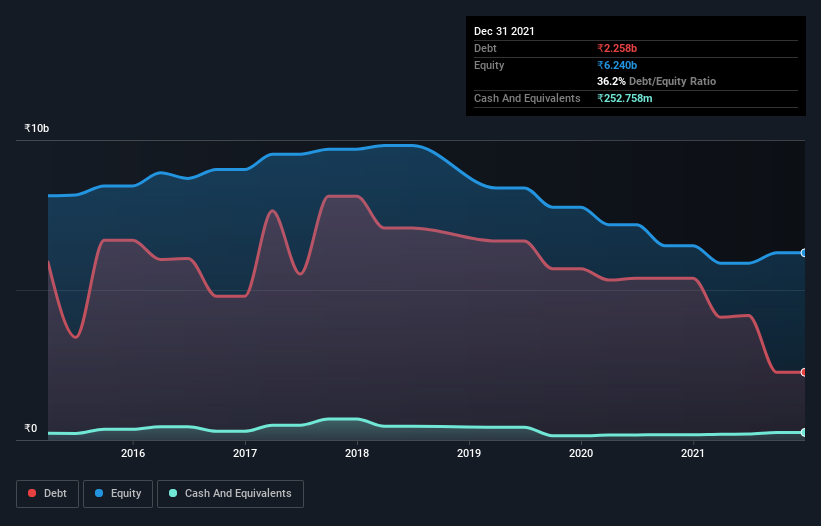The external fund manager backed by Berkshire Hathaway's Charlie Munger, Li Lu, makes no bones about it when he says 'The biggest investment risk is not the volatility of prices, but whether you will suffer a permanent loss of capital.' So it seems the smart money knows that debt - which is usually involved in bankruptcies - is a very important factor, when you assess how risky a company is. As with many other companies Ganesh Housing Corporation Limited (NSE:GANESHHOUC) makes use of debt. But is this debt a concern to shareholders?
When Is Debt A Problem?
Debt is a tool to help businesses grow, but if a business is incapable of paying off its lenders, then it exists at their mercy. If things get really bad, the lenders can take control of the business. While that is not too common, we often do see indebted companies permanently diluting shareholders because lenders force them to raise capital at a distressed price. Having said that, the most common situation is where a company manages its debt reasonably well - and to its own advantage. The first step when considering a company's debt levels is to consider its cash and debt together.
See our latest analysis for Ganesh Housing
What Is Ganesh Housing's Debt?
As you can see below, Ganesh Housing had ₹2.26b of debt at September 2021, down from ₹5.39b a year prior. On the flip side, it has ₹252.8m in cash leading to net debt of about ₹2.01b.

A Look At Ganesh Housing's Liabilities
According to the last reported balance sheet, Ganesh Housing had liabilities of ₹3.12b due within 12 months, and liabilities of ₹715.5m due beyond 12 months. On the other hand, it had cash of ₹252.8m and ₹3.70b worth of receivables due within a year. So it actually has ₹116.1m more liquid assets than total liabilities.
Having regard to Ganesh Housing's size, it seems that its liquid assets are well balanced with its total liabilities. So while it's hard to imagine that the ₹17.5b company is struggling for cash, we still think it's worth monitoring its balance sheet.
In order to size up a company's debt relative to its earnings, we calculate its net debt divided by its earnings before interest, tax, depreciation, and amortization (EBITDA) and its earnings before interest and tax (EBIT) divided by its interest expense (its interest cover). This way, we consider both the absolute quantum of the debt, as well as the interest rates paid on it.
Ganesh Housing's net debt is sitting at a very reasonable 1.9 times its EBITDA, while its EBIT covered its interest expense just 3.0 times last year. While these numbers do not alarm us, it's worth noting that the cost of the company's debt is having a real impact. We also note that Ganesh Housing improved its EBIT from a last year's loss to a positive ₹1.1b. There's no doubt that we learn most about debt from the balance sheet. But you can't view debt in total isolation; since Ganesh Housing will need earnings to service that debt. So if you're keen to discover more about its earnings, it might be worth checking out this graph of its long term earnings trend.
Finally, a company can only pay off debt with cold hard cash, not accounting profits. So it's worth checking how much of the earnings before interest and tax (EBIT) is backed by free cash flow. Looking at the most recent year, Ganesh Housing recorded free cash flow of 43% of its EBIT, which is weaker than we'd expect. That's not great, when it comes to paying down debt.
Our View
Ganesh Housing's interest cover was a real negative on this analysis, although the other factors we considered were considerably better. In particular, we thought its level of total liabilities was a positive. Looking at all this data makes us feel a little cautious about Ganesh Housing's debt levels. While we appreciate debt can enhance returns on equity, we'd suggest that shareholders keep close watch on its debt levels, lest they increase. There's no doubt that we learn most about debt from the balance sheet. However, not all investment risk resides within the balance sheet - far from it. We've identified 2 warning signs with Ganesh Housing , and understanding them should be part of your investment process.
When all is said and done, sometimes its easier to focus on companies that don't even need debt. Readers can access a list of growth stocks with zero net debt 100% free, right now.
New: Manage All Your Stock Portfolios in One Place
We've created the ultimate portfolio companion for stock investors, and it's free.
• Connect an unlimited number of Portfolios and see your total in one currency
• Be alerted to new Warning Signs or Risks via email or mobile
• Track the Fair Value of your stocks
Have feedback on this article? Concerned about the content? Get in touch with us directly. Alternatively, email editorial-team (at) simplywallst.com.
This article by Simply Wall St is general in nature. We provide commentary based on historical data and analyst forecasts only using an unbiased methodology and our articles are not intended to be financial advice. It does not constitute a recommendation to buy or sell any stock, and does not take account of your objectives, or your financial situation. We aim to bring you long-term focused analysis driven by fundamental data. Note that our analysis may not factor in the latest price-sensitive company announcements or qualitative material. Simply Wall St has no position in any stocks mentioned.
About NSEI:GANESHHOU
Ganesh Housing
Engages in the real estate and construction businesses in India.
Flawless balance sheet with solid track record and pays a dividend.
Market Insights
Community Narratives



